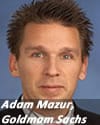As capital markets firms wait for regulators to finish writing the rules designed to avoid repeats of the 2008 financial crisis and its aftermath, sell-side firms expressed fears at last week’s TradeTech USA event that the regulatory pendulum will swing too far and further hurt the industry.
Brokers taking part in an industry panel in New York agreed that new regulations needed to be put in place to address the market’s shortcomings.
“It needs to be done in a bi-partisan approach, which involves the regulators and the sell-side,” acknowledged David Margulies, head of electronic products group at Weeden & Co..
“The market is there to raise capital and any thing that can be done to normalise it would be good,” added fellow-panelist Adam Mazur, co-head of business development at Goldman Sachs Electronic Trading.
The panelists described their greatest fear as legislators and regulators who lack a deep understanding of how the markets operate damaging the market’s flexibility in attempt to protect retail investors.
“Regulation is a powerful tool and should be handled careful,” said Richard Johnson, head of quantitative electronic services, Americas at Société Générale. “If done improperly, the industry may see quote spreads widen and overall trading costs go up.”
Of the Dodd-Frank Wall Street Reform and Consumer Protection Act, implementing possible high-frequency trading curbs and adopting the proposed trade-at rule from the US Securities and Exchange Commission (SEC), panel members believed that the regulators only managed to get only one out of the three initiatives correct while the audience, who were polled during the discussion, thought regulators had a perfect record of zero for three.
When the panel polled the audience on whether Dodd-Frank would prevent future financial crises, eliminate firms that were ‘too big to fail’, and make the market safer, 71% of the respondents did not believe that the new regulation would achieve its ultimate goals. Only 3% of the audience thought it would be successful eventually while the remainder of the audience was unsure.
Goldman Sachs’ Mazur stated that it was too early to pass judgment on Dodd-Frank citing an article reporting that only 63 of the act’s eventual 400 rules had been finalised. “The could be a lot of unintended trickle down effects,” he said.
Even if US regulators managed to get all of the final rules for Dodd-Frank correct, Weeden’s Margulies doubted that the industry would notice the success of the new regulatory regime since it was designed to prevent negative results rather than foster positive ones.
“Firms have long memories and know how to avoid situations like this in the future,” he said offering an alternative explanation for a crises-free market under Dodd-Frank.
As the conversation turned to the best manner of managing high-frequency trading – establishing minimum quote duration and/or introducing order-cancellation fees – Goldman Sachs’ Mazur said that neither option would have its desired results.
However, audience members did not share Mazur’s opinion or each other’s. After a quick poll, 31% of the audience believed that both strategies would work, 26% thought neither would work, 23% voted that cancellation fees was the best way to handle high-frequency traders and 21% stated that establishing minimum quote durations was the way to go.
Weeden’s Margulies proposed high-frequency traders be given market-maker responsibilities as well as some benefits to offset the market-making risk. “If they stayed in the market, [the 6 May, 2010 flash crash] wouldn’t have happened.”
Oliver Sung, head of execution consulting in Bank of America Merrill Lynch’s global execution services team was quick to point out that the conversation went from theory to practice when two US exchange operators announced recently pricing incentives to keep messaging levels low.
Despite these initiatives, the panelists were happy that the SEC has not move forward with the proposed ‘trade-at’ rule, which would force operators of non-displayed liquidity pools, or dark pools, to provide traders with a better price over the national best bid and offer quote on the displayed markets.
Sung attributed the SEC’s behaviour to a lack of a natural constituency for the regulation. “Through all of the comment letters they received, there wasn’t consensus on the buy-side or with the exchanges for it and the sell-side did not want it,” he explained.
Reporting by Rob Daly
